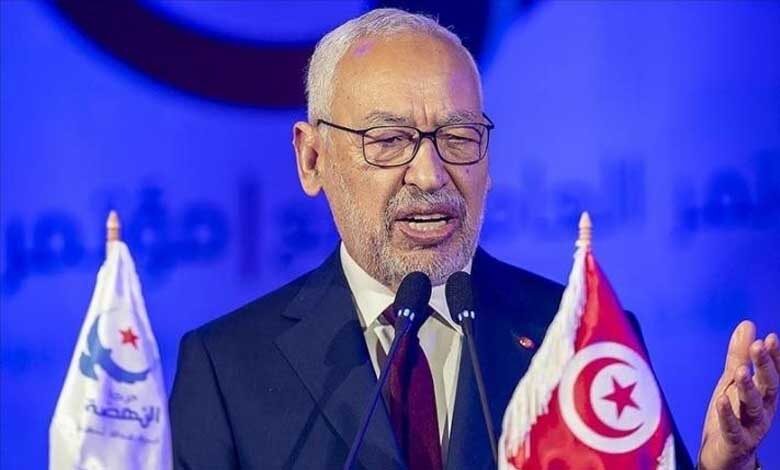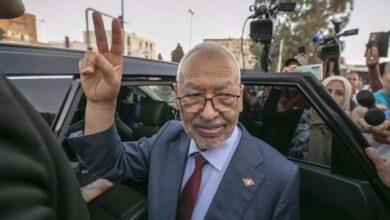Internal demands to remove Ghannouchi… The story of the Tunisian Brothers draws to a close

Ennahdha, the Muslim Brotherhood, has been experiencing an internal earthquake since July 25.
The repercussions of the suspension of the parliament and the closing of all outlets to the return of Rached Ghannouchi to the presidency of the Tunisian Legislative Council hasten day after day the end of the eightieth Sheikh who stood on the Tunisians chests throughout the last tribe.
“Rached Al-Ghannouchi..” He’s the person most rejected by Tunisians during this period.” Karim Abdel Salam, a former Ennahdha leader, said in statements to Al-Ain News that he belonged to the secret service of Ennahdha in the late 1980s, before defecting after 13 years in prison after he set fire to the headquarters of the ruling party in 1991.
Abdel Salam, who was interviewed by Al-Ain News in an earlier interview, confirmed that Ghannouchi has become one of Tunisia’s political past following Saied’s recent actions.
Ghannouchi, who has become politically isolated and prosecuted, is now also being rejected by his supporters, and even a group of Ennahdha leaders are working to remove him from the movement’s leadership in the coming days, he said.
Informed sources close to Ennahdha’s Tunisian constituencies reported that about 50 leaders within Ennahdha had proposed that Ghannouchi should be removed and that he should quit politics.
The same sources said that they asked Ghannouchi and his family to reveal his bank accounts from 2013 to 2021, noting that some of the leaders who are angry at Ghannouchi are in the process of preparing a public opinion statement that reveals the financial crimes of the leader of the Tunisian Muslim Brotherhood.
This division within the Muslim Brotherhood family was reflected today in the content of the statement issued by the Muslim Brotherhood party, which softened the tone of the speech towards Tunisian President Kais Saied.
The statement said the July 25 presidential decrees broke a closed circle in search of solutions.
This decline in the Muslim Brotherhood’s position toward Tunisian President Kais Saied is seen by many observers as an indication of an internal breakdown in the core of the Muslim Brotherhood octopus, while some consider it a Muslim Brotherhood “technique” that carries the slogan of bowing down until the storm passes.
Demands to remove Ghannouchi
On top of the opponents to Ghannouchi’s leadership, sources close to Ennahdha tell Al Ain News that former Minister of Health Abdellatif Mekki and MP Samir Dilou, as well as Imed Hammami, are leading the campaign to remove Ghannouchi from the political scene.
The sources said that Ghannouchi had agreed to quit Ennahdha at the first party congress and withdraw from the political scene, which is scheduled to be held at the end of this year.
The sources confirmed that three local offices (Siliana Governorate, Sousse, and Mahdia) resigned from Ennahdha after Tunisian President Kais Saied suspended parliament.
The End of Ghannouchi
Political sociology professor Jihad Al-Aidoudi said that the departure of Rached Ghannouchi from Ennahdha means the immediate end of the Brotherhood era in Tunisia, as he is the first man in the movement, who has the ability to control foreign funding since 1981.
He said in a statement to Al-Ain News that the demand of party leaders to dismiss Ghannouchi is an attempt to save the movement from political corruption and terrorist operations related to Ennahdha since the assassination of leftist leader Chokri Belaid and national leader Mohamed Al-Brahmi in 2013.
Ghannouchi is living under an unprecedented political and judicial siege, as he appeared before a judge investigating terrorism cases on Friday as a suspect in the assassination of Chokri Belaid.
Judicial sources confirmed to Al Ain News that Ghannouchi spent four hours in the center of investigation in Al Awinah, a suburb of the capital Tunisia, to answer for his relationship with Abdelaziz Daghesi, who is accused of arranging logistics in the assassination of Belaid and Al Brahmi.












